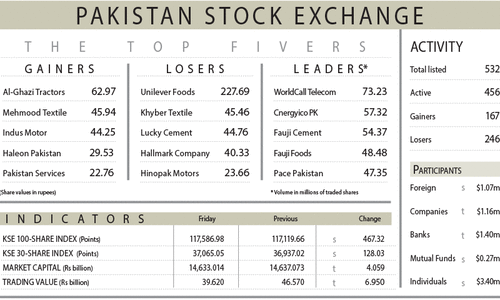While the cost of doing business in Pakistan is stated to be high as compared to other regional countries, the rapid depreciation of the rupee would make matters worse for investors wanting to set up export-oriented industries based on imported technology.
The cost of investment may become prohibitive at a time when the $40 billion imports could offer opportunities for import substitution specially in areas where the country has domestic advantage for exports. Over the past half decade or more, there has been industrial consolidation and it is time to initiate expansion of manufacturing based on sophisticated technology. In new projects, the costs may have to be cut down by maximising the use of indigenous engineering and other production facilities.
It has been the normal practice to reduce imports and boost exports by not so much by increasing industrial productivity and efficiency, by innovations in technology or value-added products as by making imports costlier for domestic consumers and exports cheaper for foreign buyers. Devaluation brings short-term gains as costly imported industrial inputs make export goods costlier. Besides, the hike in interest rates is also raising financial charges.
The possible slowing down of new industrial investment will also coincide this year with slashing of the development spending by the government reportedly in the range of Rs100-110 billion. It may translate in slowing down of economic growth.
In the larger Pakistani market, with 160 million consumers, there are also problems for the traders and the industrialists. The cost of doing business here is higher than in India and China.
The cost of production is high, partly due to the shortage and failure in supply of electricity and irregular supply of water. These two are major deterrents to higher production in too many fields. The cost of transportation is also the highest in the region, according to the World Bank. The Karachi Port Trust is the most costly port in the region All these factors deter rapid development and industrial growth.
Labour is cheap but unskilled and is marked for its low productivity. Neither the government nor the industry has taken up this issue seriously. Red tape is a major issue. Provincial governments are not excited by some of the projects which the federal government wants to launch. Thus, some projects take a long time to mature.
Punjab government says that federal projects, initiated by the centre, distort provincial priorities for development.
Singapore tried to solve the problem of red tape by having an investment centre in the prime minister’s office to expedite problems sponsored by foreigners. Any foreigner with a project can approach the prime minister’s office and get the problem solved expeditiously. This approach has also been tried in Pakistan but lacked institutional approach.
We have an investment board with a senior officer but it does not have enough clout to untie the knots and solve the problems.
Judicial laxity is another issue. Cases take a long time to decide and once decided the judgment does not get implemented so easily.
The last government succeeded in attracting large foreign investment through a liberal free- for- all policy. It allowed a foreign investor to invest in any venture and make as much profit as possible and remit the money. But much of the investment came in telecom and financial sector through privatisation and sale of private enterprises to the foreigners. This policy failed to attract investment in export-oriented industries.
The policy is still valid and stands to attract foreign investors. In the last fiscal year, the foreign direct investment ( FDI) was over $5.1 billion , slightly higher than the previous year. With steep fall in rupee, foreigners with dollars will find it cheaper to invest in Pakistan. A window of opportunity is also to be opened up with sovereign guarantee in projects set up through public and private partnership.












































Dear visitor, the comments section is undergoing an overhaul and will return soon.